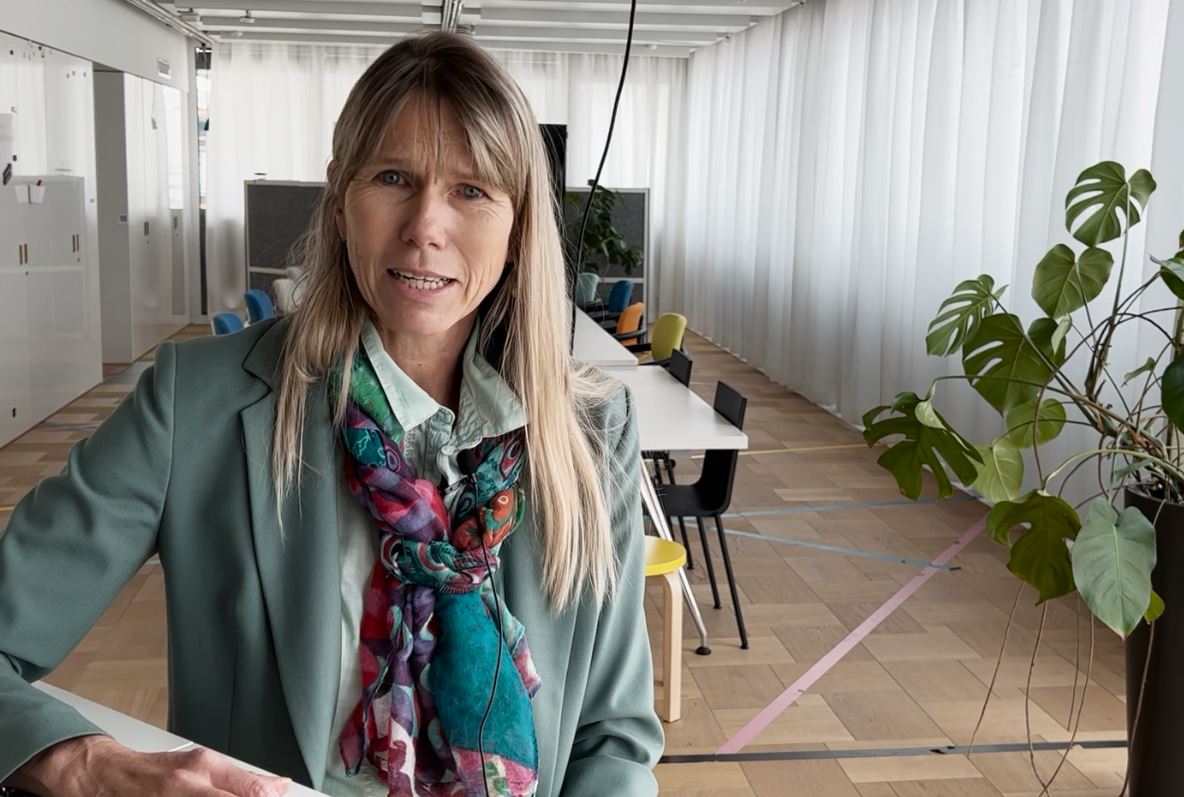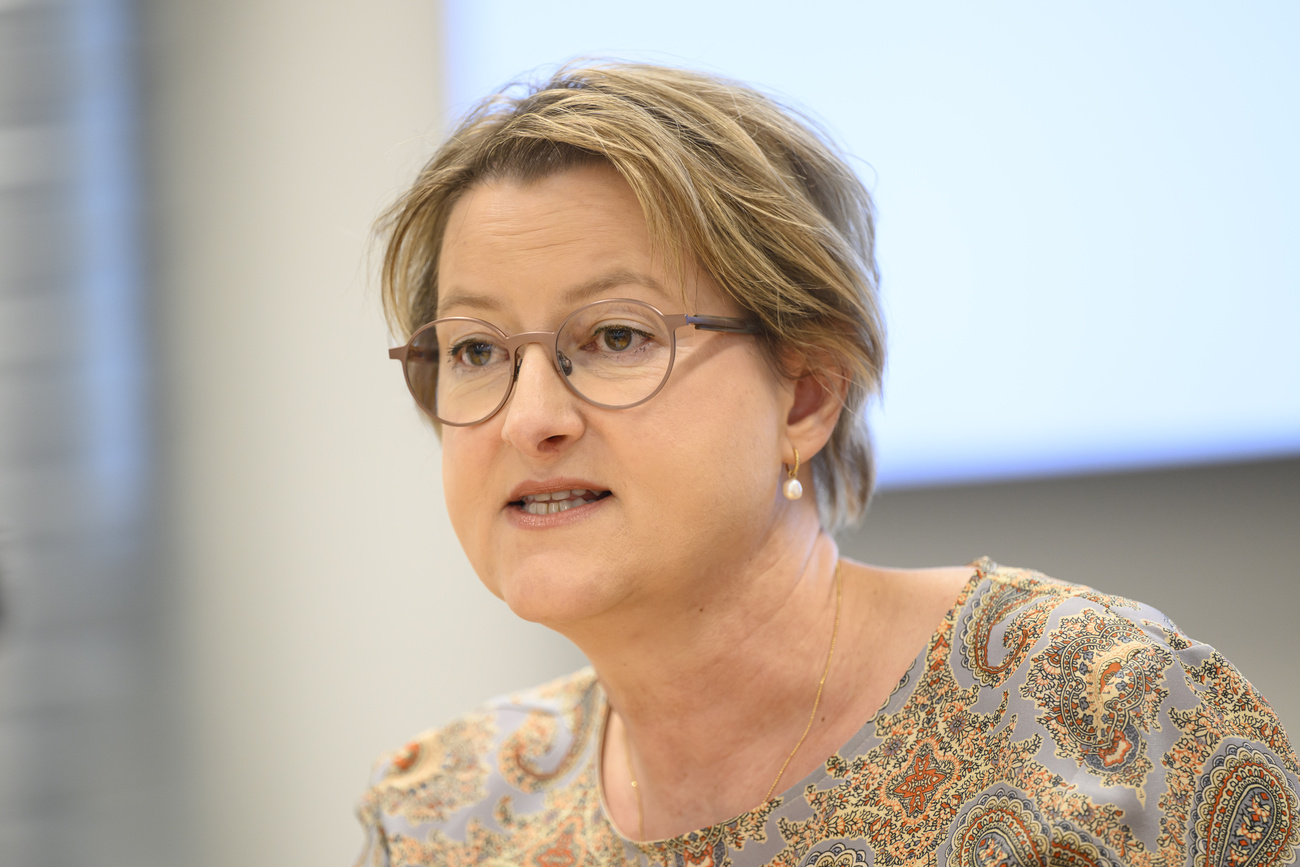
‘Switzerland should be a model country for innovative sustainability solutions’

The Swiss Federal Laboratories for Materials Science and Technology (Empa) has a female CEO for the first time in its 142-year history. Tanja Zimmermann explains how the institute is helping both industry and society move towards more sustainable energy systems.
Last July scientists announcedExternal link they had discovered that copper exposure in the environment, together with a protein in the human brain called alpha-synuclein, could play an important role in the development of Parkinson’s disease.
The discovery did not come from a university hospital or from a pharma start-up but from EmpaExternal link – the Swiss Federal Laboratories for Materials Science and Technology – in collaboration with the University of Limerick in Ireland.
It has been decades since Empa was solely a federal laboratory for materials testing. Originally it focused on construction materials and then also textiles, but in the late 1980s it shifted towards interdisciplinary work. Today its areas of research range from nanotechnology to urban systems for energy production and distribution. It is a public institute committed to industry and sustainability and to fostering innovative start-ups.
Empa’s five departments and 29 laboratories are spread over three sites: in Dübendorf (a suburb of Zurich), St Gallen, and Thun. It employs some 1,000 people, who publish more than 600 scientific papers every year. Together with the federal institutes of technology ETH Zurich and EPFL in Lausanne and three other research institutes, it forms the ETH DomainExternal link.
In the three years prior to becoming CEO, Zimmermann created Empa’s Materials and Technology Centre of Robotics, in collaboration with Imperial College London. In 2011, she became the head of Empa’s Applied Wood Materials laboratory, and in 2017 she was appointed a member of the directorate and head of the Functional Materials department. This department oversees not only wood but also materials and components used in energy production, concrete, asphalt, high-performance ceramics, and polymer fibres.
Source: Empa
SWI swissinfo.ch: Empa focuses strongly on sustainable development. But the materials and processes used in construction and industry are often far from sustainable. How do you handle this?
Tanja Zimmermann: We help industry make them sustainable. Here’s a good example: concrete. Its production and use are responsible for 7-8% of global CO2 emissions. We have a lab dedicated to concrete and asphalt and also joint research projects with the concrete industry. We’re developing new binders and additives. We can also use renewable energy to produce these binders or manufacture them in low-temperature furnaces.
And we see that in this area, as in many others, industry is open to change. It wants to become more sustainable.
SWI: You’ve done a lot of work on wood. It is an abundant resource in Switzerland, but it isn’t widely used. Do you see it as a material of the future in construction or other sectors?
T.Z.: It is Switzerland’s only renewable resource, and it is indeed under-utilised. The wood resources of our forests add up to roughly ten million cubic metres per year, but we only use five million. Yet we could use up to eight million. It would be a bad idea to use all ten million, but we have an opportunity to increase to eight million.
It’s increasingly common to use wood for construction, in combination with other materials. In Switzerland, for example, there’s the Pi project in canton Zug [for] an 80-metre residential tower. Wood offers many advantages: it is intrinsically light, solid, and eco-friendly. For the moment, it makes up about 16% of construction materials in Switzerland. That could be increased.
On the other hand, we’re not very good at recycling wood. In general we simply burn it, although it could be re-used in a circular economy for chemical products, for fibres, or for 3D printing. We are currently conducting research in these areas.
SWI: Empa is a public institution. Does it have a political mission to reorient industry towards sustainability?
T.Z.: Our role is to help industry and society meet current challenges, the most urgent being the energy transition. So it’s fitting that we remain a public entity. This guarantees our independence and impartiality and allows us to work with companies that compete with each other. They trust us completely, which would not be the case if we were financed by a private company or group of companies.
SWI: Is your expertise being exported to other countries?
T.Z.: Swiss industry remains our most important client. But working with international partners is essential because we are facing questions and challenges that are truly global in scope.
So our research projects are part of a wide network, both in Europe and overseas. And I’d add, by the way, that our current exclusion from European [research] programmes [as a result of a deadlock over Swiss-EU bilateral relations] is very difficult for us.
SWI: We just experienced a record-beating summer of heat, drought, fires, and floods. Are you, as a scientist, worried about the accelerating climate crisis?
T.Z.: Of course, I’m extremely worried. I believe we can help fight the problem with technological solutions, but that won’t be enough. We must also change the way we live.
SWI: Do you think the Swiss are sufficiently aware of this?
T.Z.: I’m not very optimistic on that front. I think a segment of the population still feels that the climate crisis is a distant issue. They tell themselves that we had a beautiful summer, that it was warm, that it was good for the holidays. As long as it doesn’t really affect their daily lives, it remains abstract for them.
This shows that we have to continue working on our communication. Because the facts are clear – they are on the table. I also have to point out that Switzerland’s high standard of living allows us to think about these problems and work on solutions. But in other countries, where people might have to focus on securing enough food for the coming months, or for the next day, the topic is not necessarily a priority.
SWI: To what degree are politicians aware of these problems, in your opinion?
T.Z.: My current feeling is that we need to bring them here, to Empa, and really try to make them aware of their responsibility and give them the information they need to make decisions.
We do this regularly, even with the federal ministers. In late August, for example, we had a visit from Finance Minister Ueli Maurer. We invite everyone, including the parties whose primary concern may not be sustainability.
This gives us an opportunity to demonstrate our new technologies and developments. And we say this: in politics, if you always debate the 20% [of issues] you disagree on, you’ll never move forward. But if you concentrate on the 80% you do agree on, you can make important advances.
SWI: Switzerland is a top performer when it comes to recycling and water purification. Is it also at the forefront of sustainable development?
T.Z.: No. I think some countries are making more rapid progress. It’s true that we’re very creative, and we file many patents, but we aren’t great at putting these innovations into practice at an industrial level.
Yet we are a technologically advanced country. We should therefore be a model for others and show that we’re really working on new solutions and can apply them.

SWI: Does it feel significant that you are Empa’s first female CEO?
T.Z.: First of all, I’m delighted that after the many stages of the application process I was elected Empa’s CEO. I’ve dedicated myself to this institution for decades, and now I will also be able to shape its future. This is truly a great honour.
For me, gender is not what is important. But it’s true that I’m the first female CEO in Empa’s 142-year history, and I’m happy that it is now possible for women to attain these leadership positions.
I’ve never encountered problems in my professional career. I’ve always had good mentors who have supported me. And I want to offer the same support to our young talent, especially to the young women so that they don’t stop working when they start a family.
SWI: How many of Empa’s 1,000 employees are women?
T.Z.: 30%. But I have to admit that in management positions like group leader [or] head of laboratory, we don’t have enough [women], and that is something I really want to work on.
SWI: And is that something you can change?
T.Z.: It’s something I want to change, yes.
Adapted from French by Katherine Bidwell/gw

In compliance with the JTI standards
More: SWI swissinfo.ch certified by the Journalism Trust Initiative































You can find an overview of ongoing debates with our journalists here . Please join us!
If you want to start a conversation about a topic raised in this article or want to report factual errors, email us at english@swissinfo.ch.